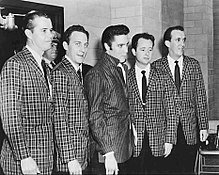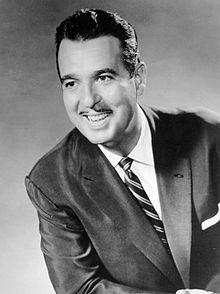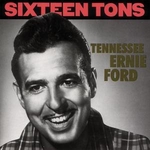They are known for providing background vocals for Elvis Presley,
in live appearances and recordings from 1956 to 1972.
The group has
also worked in the recording studio, on stage, and on television with
many other country and rock and roll artists.
| The Jordanaires | |
|---|---|

The Jordanaires with Elvis, 1957
|
|
| Background information | |
| Origin | Springfield, Missouri, U.S. |
| Genres | Gospel, country, rock & roll, folk |
| Years active | 1948–2013 |
| Associated acts | Foggy River Boys, Elvis Presley, Eddy Arnold, Ricky Nelson |
| Website | jordanaires |
| Past members | Ray Walker Curtis Young Gordon Stoker Bill Matthews Bob Hubbard Warren (Monty) Matthews Culley Holt Hoyt Hawkins Neal Matthews, Jr. Don Bruce Hugh Jarrett Duane West Louis Nunley |
Group history
Early years
The history of the Jordanaires can be traced back to the early 1940s, and the original Foggy River Boys, which were made up of the Matthews brothers, all ordained ministers: Bill (b. LaFollette, Tennessee, 1923), Monty (b. Pulaski, Kentucky, 1927), Jack, and Matt.In 1948, Matt and Jack left to become full-time preachers and were replaced by Bob Hubbard (b. Chaffee, Missouri, 1928), also a minister, and bass singer Culley Holt (b. McAlester, Oklahoma, 1925), and pianist Bob Money.
After three years Money was replaced as pianist by Gordon Stoker. At that time, they formed the new group as the Melodizing Matthews, in Springfield, Missouri, but soon changed the name to the Jordanaires, after Jordan Creek in Missouri.
This starting lineup lasted until 1949; at that time, Bob Hubbard was drafted and was replaced by Hoyt Hawkins. Later that year, Monty and Bill Matthews left.
Hawkins switched to baritone, and new lead Neal Matthews was recruited. Don Bruce came in as a new first tenor; however, he was drafted the next year.
The group narrowed to a quartet, with Stoker taking over as first tenor. They became members of the Grand Ole Opry in 1949.[1][2]
They recorded for Capitol Records in the early 1950s, and began providing vocal accompaniment behind solo singers in Nashville, Tennessee.[2]
The lineup changed again in 1954, with Cully Holt leaving and new bass Hugh Jarrett coming in.
The quartet became well known in the southern gospel realm, and what made them stand out from other quartets of that time was how they would bring spirituals (such as "Dry Bones") to a predominantly white audience.
While continuing to turn out gospel albums of their own, the group become better known for the signature background harmonies they have provided on dozens of secular records.[3]
Jarrett remained until 1958; at that time, he was replaced by Ray Walker.
With Elvis Presley
One Sunday afternoon in 1955, the Jordanaires played a show in Memphis with Eddy Arnold to publicize their new syndicated TV series, Eddy Arnold Time (for the program the group used the name Gordonaires).They sang "Peace in the Valley", and when the show was over, Elvis Presley, an emerging singer, talked with them and said, "If I ever get a recording contract with a major company, I want you guys to back me up."[4]
He was on Sun Records at that time.
On January 10, 1956, Presley recorded his first session for RCA with guitarist Scotty Moore, bassist Bill Black, and drummer D. J. Fontana. "I Got a Woman", "Heartbreak Hotel", and "Money Honey" were recorded.
Presley asked his new label RCA Victor if the Jordanaires could appear on the recordings.
The next day Gordon Stoker was called by Chet Atkins to do a session with a new young singer named Elvis.
RCA had also just signed the Speer Family. Atkins asked Stoker to sing with Ben and Brock Speer so he could use them.
The recording session for "I'm Counting on You" and "I Was the One" was the first session Presley did with vocal background.
By April 1956, "Heartbreak Hotel" was No. 1.
After having done several more recording sessions in New York with Moore, Black, and Fontana, Presley flew to Nashville on April 14, 1956, to record "I Want You, I Need You, I Love You".
Stoker was called again, to sing a vocal trio with Ben and Brock Speer.
After the session, Presley took Stoker aside and told him (not knowing, at the time, why all the Jordanaires were not there) that he had wanted the Jordanaires.
This time, Stoker saw to it—and Presley used the quartet on nearly every one of his recording sessions for the next 14 years.
The quartet also appeared in some of Presley's movies, and on many of his television appearances.
As Presley was about to start performing at the Hilton in Las Vegas, the Colonel's office called for the Jordanaires to work with Presley in the shows.
They had 35 recording sessions already booked for the dates he needed, so they could not go.
They got in touch with the Imperials, who had done the How Great Thou Art Elvis Presley album with them, and the Imperials took the place of the Jordanaires.
After Elvis
The lineup consisting of Gordon Stoker, first tenor and manager, Neal Matthews, second tenor and lead, Hoyt Hawkins, baritone, and Ray Walker, bass, would be the group's most stable lineup, lasting throughout the 1960s and 1970s.In January 1978 the group performed a medley of Presley's songs on the NBC TV special Nashville Remembers Elvis on His Birthday.
The group changed again in 1982, when Hoyt Hawkins died. His replacement was Duane West, formerly of Sonny James' backup group, the Southern Gentlemen.
In 1990, the group provided backing vocals for Presley's former Sun Records labelmate Johnny Cash on his Mercury Records album Boom Chicka Boom.
The lineup remained constant for the rest of the decade, with West leaving due to illness in 1999 (he died June 23, 2002). His replacement was Louis Nunley, formerly of the Anita Kerr Singers.
Neal Matthews died April 21, 2000. He was replaced by new lead Curtis Young.
Hugh Jarrett died at 78 on May 31, 2008 from injuries sustained in an auto accident in March.[5]
Gordon Stoker died at 88 at his Brentwood, Tennessee, home on March 27, 2013 after a long illness.
His son Alan confirmed that the Jordanaires were formally dissolved, per his father's wishes.[6]
Ernest Jennings Ford (February 13, 1919 – October 17, 1991), known professionally as Tennessee Ernie Ford, was an American recording artist and television host who enjoyed success in the country and Western, pop and gospel musical genres.
Noted for his rich bass-baritone voice and down-home humor, he is remembered for his hit recordings of "The Shotgun Boogie" and "Sixteen Tons".
| Tennessee Ernie Ford | |
|---|---|
 |
|
| Background information | |
| Birth name | Ernest Jennings Ford |
| Born | February 13, 1919 Bristol, Tennessee, United States |
| Died | October 17, 1991 (aged 72) Reston, Virginia, United States |
| Genres | Country & Western, Pop, Gospel |
| Occupation(s) | Singer, actor |
| Instruments | Vocals, Guitar, violin |
Biography
Early years
Born in Bristol, Tennessee to Maud Long and Clarence Thomas Ford, Ford began his radio career as an announcer at WOPI-AM in Bristol, Tennessee.In 1939, the young bass-baritone left the station to study classical singing at the Cincinnati Conservatory of Music in Ohio.
First Lieutenant Ford served in the United States Army Air Corps in World War II as the bombardier on a B-29 Superfortress flying missions over Japan.
After the war, Ford worked at radio stations in San Bernardino and Pasadena, California.
In San Bernardino, Ford was hired as a radio announcer.
He was assigned to host an early morning country music disc jockey program titled Bar Nothin' Ranch Time. To differentiate himself, he created the personality of "Tennessee Ernie," a wild, madcap, exaggerated hillbilly.
He became popular in the area and was soon hired away by Pasadena's KXLA radio.
Ford also did musical tours. The Mayfield Brothers of West Texas, including Smokey Mayfield, Thomas Edd Mayfield, and Herbert Mayfield, were among Ford's warmup bands, having played for him in concerts in Amarillo and Lubbock, during the late 1940s.
At KXLA, Ford continued doing the same show and also joined the cast of Cliffie Stone's popular live KXLA country show Dinner Bell Roundup as a vocalist while still doing the early morning broadcast.
Cliffie Stone, a part-time talent scout for Capitol Records, brought him to the attention of the label.
In 1949, while still doing his morning show, he signed a contract with Capitol. He also became a local TV star as the star of Stone's popular Southern California Hometown Jamboree show.
RadiOzark produced 260 15-minute episodes of The Tennessee Ernie Show on transcription disks for national radio syndication.
He released almost 50 country singles through the early 1950s, several of which made the charts.
Many of his early records, including "The Shotgun Boogie", "Blackberry Boogie," and so on were exciting, driving boogie-woogie records featuring accompaniment by the Hometown Jamboree band which included Jimmy Bryant on lead guitar and pioneer pedal steel guitarist Speedy West.
"I'll Never Be Free," a duet pairing Ford with Capitol Records pop singer Kay Starr,[1] became a huge country and pop crossover hit in 1950.
A duet with Ella Mae Morse, False Hearted Girl was a top seller for the Capitol Country and Hillbilly division,[2] and has been evaluated as an early tune.[3]
Ford eventually ended his KXLA morning show and in the early 1950s, moved on from Hometown Jamboree. He took over from band-leader Kay Kyser as host of the TV version of NBC quiz show Kollege of Musical Knowledge when it returned briefly in 1954 after a four-year hiatus.
He became a household name in the U.S. largely as a result of his hilarious portrayal in 1954 of the 'country bumpkin,' "Cousin Ernie" on three episodes of I Love Lucy.
In 1955, Ford recorded "Davy Crockett, King of the Wild Frontier" (which reached number 4 on the country chart) with "Farewell to the Mountains" on side B.
"Sixteen Tons"
Ford scored an unexpected hit on the pop charts in 1955 with his rendering of "Sixteen Tons", a sparsely arranged coal-miner's lament, that Merle Travis first recorded in 1946 reflecting his own family's experience in the mines of Muhlenberg County, Kentucky.The song's authorship has been claimed by both Travis and George S. Davis.
Its fatalistic tone contrasted vividly with the sugary pop ballads and rock & roll just starting to dominate the charts at the time:
- You load sixteen tons, what do you get?
- Another day older and deeper in debt.
- Saint Peter, don't you call me, 'cause I can't go;
- I owe my soul to the company store...[4]
The record sold over four million copies, and was awarded a gold disc.[5]
It made Ford a crossover star, and became his signature song.
Later years
| This section needs additional citations for verification. (December 2015) |
Ford subsequently helmed his own prime-time variety program, The Ford Show, which ran on NBC television from October 4, 1956, to June 29, 1961.
The show was named not after Ernie, but rather, the sponsor – Ford automobiles. Ford Theatre, an anthology series, had run in the same time slot on NBC in the preceding 1955–1956 season.
Ford's program was notable for the inclusion of a religious song at the end of every show; Ford insisted on this despite objections from network officials who feared it might provoke controversy.
This became the most popular segment of his show. He earned the nickname "The Ol' Pea-Picker" due to his catch-phrase, "Bless your pea-pickin' heart!" He began using the term during his disc jockey days on KXLA.
In 1956 he released Hymns, his first gospel music album, which remained on Billboard's Top Album charts for 277 consecutive weeks; his album Great Gospel Songs won a Grammy Award in 1964.
After the NBC show ended, Ford moved his family to Portola Valley in Northern California.
He also owned a cabin near Grandjean, Idaho on the upper South Fork of the Payette River where he would regularly retreat.
A photo of Ford with country singer Hank Thompson and Dallas nightclub owner Jack Ruby appeared in the 1988 book, The Ruby-Oswald Affair, by Alan Adelson.
From 1962 to 1965, Ford hosted a daytime talk/variety show, The Tennessee Ernie Ford Show (later known as Hello, Peapickers) from KGO-TV in San Francisco, broadcast over the ABC television network.
In 1968, Ford narrated the Rankin/Bass Thanksgiving TV special The Mouse on the Mayflower. The mouse narrator seen at the beginning of the special, William the Churchmouse, was a caricature of Ford.
Ford was the spokesman for the Pontiac Furniture Company in Pontiac, Illinois in the 1970s.
He also became the spokesman for Martha White brand flour in 1972.
Ford's experiences as a navigator and bombardier in World War II led to his involvement with the Confederate Air Force (now the Commemorative Air Force), a war plane preservation group in Texas.
He was a featured announcer and celebrity guest at the annual CAF Airshow in Harlingen, Texas, from 1976 to 1988.
He donated a once-top-secret Norden Bombsight to the CAF's B-29 bomber restoration project. In the late 1970s, as a CAF colonel, Ford recorded the organization's theme song "Ballad of the Ghost Squadron."
Over the years, Ford was awarded three stars on the Hollywood Walk of Fame, for radio, records, and television. He was awarded the Presidential Medal of Freedom in 1984, and was inducted into the Country Music Hall of Fame in 1990.
Offstage, both Ford and wife Betty contended with serious alcohol problems; Betty had had the problem since the 1950s.
Though his drinking worsened in the 60s, he worked continuously, seemingly unaffected by his heavy intake of whiskey.
By the 1970s, however, it had begun to take an increasing toll on his health and ability to sing. After Betty's substance abuse-related death in 1989, Ernie's liver problems, diagnosed years earlier, became more apparent, but he refused to reduce his drinking despite repeated doctors' warnings.[citation needed]
In 1990, he was inducted into the Country Music Hall of Fame.
His last interview was taped in September 1991 by his long-time friend Dinah Shore for her TV show. His physical deterioration by then was quite obvious.
Ford received posthumous recognition for his gospel music contributions by adding him to the Gospel Music Association's Gospel Music Hall of Fame in 1994.
Personal life
Ernie and Betty Ford at home in 1962.
Less than four months after Betty's death, Ford, who had long suffered from severe alcoholism, married again. On September 28, 1991, he fell into severe liver failure at Dulles Airport, shortly after leaving a state dinner at the White House hosted by then President George H. W. Bush.
Ford died in H. C. A. Reston Hospital Center, in Reston, Virginia, on October 17 – exactly 36 years after "Sixteen Tons" was released, and one day shy of the first anniversary of his induction into the Country Music Hall of Fame.[6]
Ford was interred at Alta Mesa Memorial Park, Palo Alto, California.[7]
His second wife, Beverly Wood Ford (1921–2001), died ten years after Ernie and her body was interred with her husband's.[8]
Source: Wikipedia.org
Somebody Come and Play in Traffic with Me! Earn as You Learn, Grow as You Go!
The Man Inside the Man
from
Sinbad the Sailor Man
A
JMK's Production
Share this page, If you liked It Pass it on, If you loved It Follow Me!
TTFN
CYA Later Taters!
Thanks for watching.
Donnie/ Sinbad the Sailor Man
Somebody Come and Play in "Traffic" with me. If you would like to "Join" A Growing Biz Op! Here is Your Chance to get in an Earn While You Learn to Do "The Thing" with us all here at Traffic Authority.
Simply click this link and Grow as you Go Come and Play In Traffic With Me and My Team at Traffic Authority!
Everybody Wants Traffic! They All Need Eyes Upon their sites and offerings. Get That Here!
Simply click this link and Grow as you Go Come and Play In Traffic With Me and My Team at Traffic Authority!
Everybody Wants Traffic! They All Need Eyes Upon their sites and offerings. Get That Here!
P.S. Everybody Needs Traffic! Get Top Tier North American Traffic Here!




No comments:
Post a Comment